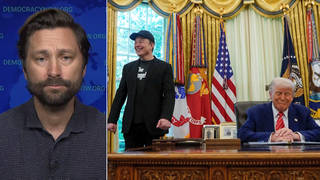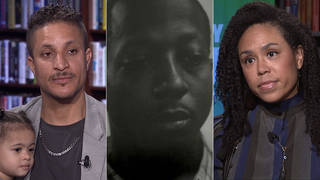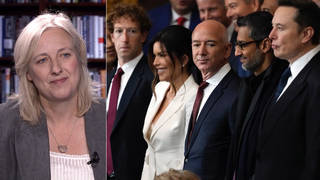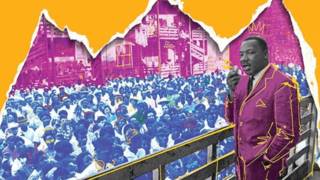
Topics
Guests
- Wisdom Colenational director, NAACP Youth and College Division.
- Janelle Wongprofessor and director of Asian American Studies, University of Maryland.
- Maria Hinojosajournalist and founder, Futuro Media.
The conservative majority of the U.S. Supreme Court has declared race-conscious admissions policies at colleges and universities across the country to be unlawful, effectively ending affirmative action in education. The landmark 6-3 ruling was along ideological lines and strikes down decades of precedent, but stops short of banning legacy admissions and allows military academies to continue using affirmative action. Justice Ketanji Brown Jackson, the first Black woman to serve on the court, assailed the majority’s “let-them-eat-cake obliviousness” to questions of racism and equity. We host a roundtable discussion on the ruling and its impact with Wisdom Cole, national director of the NAACP Youth and College Division; Janelle Wong, director of Asian American studies and a professor of American studies and government and politics at the University of Maryland; and Pulitzer Prize-winning journalist Maria Hinojosa, founder of Futuro Media and host of the Latino USA podcast.
Transcript
AMY GOODMAN: This is Democracy Now!, democracynow.org, The War and Peace Report. I’m Amy Goodman.
Today, we spend the hour looking at new U.S. Supreme Court decisions that will have far-reaching implications in the lives of millions of people. We begin with the court’s landmark ruling Thursday that gutted affirmative action when it ruled Harvard and the University of North Carolina’s programs considering race in college admissions are unconstitutional. The 6-to-3 decision overturns long-standing precedent. The court stopped short of barring legacy admissions and will allow military academies to continue using affirmative action.
Writing for the majority, Chief Justice John Roberts assailed race-conscious admissions as “elusive,” “imponderable” and “opaque,” ruling they violate the equal protection clause of the 14th Amendment.
Justice Ketanji Brown Jackson, the first Black woman appointed to the court, wrote in her dissent the decision, quote, “is truly a tragedy for us all.” She added, “With let-them-eat-cake obliviousness, today, the majority pulls the ripcord and announces 'colorblindness for all' by legal fiat.”
Meanwhile, Justice Clarence Thomas, who’s now the longest-serving justice on the conservative-majority court and is African American, sided with the majority and read his concurrence from the bench, saying, quote, “Even in the segregated South where I grew up, individuals were not the sum of their skin [color]. … While I am painfully aware of the social and economic ravages which have befallen my race and all who suffer discrimination, I hold out enduring hope that this country will live up to its principles so clearly enunciated in the Declaration of Independence and the Constitution of the United States: that all men are created equal, are equal citizens, and must be treated equally before the law.” That was Justice Clarence Thomas Thursday.
During the oral arguments for this case, Justice Thomas questioned North Carolina state Solicitor General Ryan Park, who represented the University of North Carolina.
JUSTICE CLARENCE THOMAS: I didn’t go to racially diverse schools, but there were educational benefits. And I’d like you to tell me expressly, when a parent sends a kid to college, that they don’t necessarily send them there to have fun or feel good or anything like that. They send them there to learn physics or chemistry or whatever they’re studying. So, tell me what the educational benefits are.
AMY GOODMAN: This comes as PBS Frontline examined Justice Thomas’s stance on affirmative action from his time in law school to Thursday’s ruling. Frontline reported on how Thomas arrived at Yale Law School as one of 12 Black students, and interviewed his classmate John Bolton, former national security adviser.
JOHN BOLTON: He believed that people assumed he was there as a beneficiary of affirmative action, and it grated on him.
MICHAEL FLETCHER: He has this feeling of, “Oh, I’m around these white students,” who he senses question his presence at Yale. How is it that you — not just you, Clarence Thomas, but you, all you Black students — are here? Is it because of merit? Or is it because of affirmative action?
AMY GOODMAN: Today, we begin today’s show with a roundtable discussion on the Supreme Court’s restriction of consideration of race in college admissions, effectively overturning decades of court precedent. Wisdom Cole, NAACP national director of Youth and College Division, is with us. Janelle Wong is director of Asian American Studies, professor of American studies and government and politics at the University of Maryland. Her piece for the Los Angeles Times, “Affirmative action isn’t hurting Asian Americans. Here’s why that myth survives.” And Maria Hinojosa, Pulitzer Prize-winning journalist, founder of Futuro Media, host of Latino USA, co-host of the podcast In the Thick.
We welcome you all to Democracy Now! Wisdom Cole, let’s begin with you. The Supreme Court has gutted affirmative action in colleges and universities around the country — oh, well, not in military academies. But can you, overall, respond?
WISDOM COLE: You know, this was a devastating decision. You know, a rogue court bowed down to an extremist-minority influence that is going to impact the next generation of thought leaders and Americans. You know, in this moment in time, we need to see our colleges, universities and even corporations commit to diversity, no matter what.
AMY GOODMAN: And if you can talk further about the significance of this decision and what has puzzled many, that while chief justice, who read the decision out for the majority, said that this doesn’t apply — this cannot apply anymore to colleges — this actually, by the way, goes into effect in 2028, 25 years after an affirmative action decision in 2003 that was authored by the Republican Supreme Court Justice Sandra Day O’Connor — that this applies to colleges and universities, but not to military academies, where he saw value in officer diversity — the idea of fine for the barracks but not the boardroom?
WISDOM COLE: Yeah, you know, the same value that we have in making sure that we are having diversity in our military, we have to have that same value for higher education, because oftentimes higher education is the access to the halls of power. Right? We want to make sure that our colleges and universities truly reflect America when it comes to diversity of thought. You know, we need to make sure that we have some of the most diverse minds thinking about the best solutions to some of the most difficult problems that we are facing in America today. And if we are removing that access for diverse students to that space and place in higher education, then we are not meeting the mark, and we’re going to miss the moment, and we’re not going to be able to solve the problems that are coming our way.
AMY GOODMAN: You wrote in social media, “Our future depends on racial equity and diversity in higher education, the SCOTUS Affirmative Action decision has put us on a path to re-segregate our educational system.” Can you explain?
WISDOM COLE: You know, this decision is going to have impacts for generations to come. And when we think about the way in which young people have the options and choices to go to different colleges and universities, we shouldn’t think that the gutting of affirmative action is now an influence or push for young people just to go to HBCUs. Yes, we need to highly invest in our HBCUs and our MSIs and ensure that young people have access to those places and spaces, but young people need to have options and choices to go to whatever universities they want to see. I think it’s important for us to understand that we cannot be on a path to resegregate higher education as we know it today, because that is effectively rolling back the rights that are being fought for each and every single day.
AMY GOODMAN: I want to turn to Janelle Wong, who’s director of Asian American Studies, professor of American studies and government and politics at the University of Maryland. You wrote a piece with the great writer Viet Thanh Nguyen titled “Affirmative action isn’t hurting Asian Americans. Here’s why that myth survives.” Now, this is extremely significant for people to understand where this case came from. If you can talk about the Students for Fair Admissions, this done supposedly to stop discrimination against Asian Americans?
JANELLE WONG: Well, this is an extremely disappointing ruling, especially because, as you say, a false narrative about an Asian American penalty was used for target one essential tool — affirmative action — that helps open up doors to diversity and opportunities for education. And that is, the group suing Harvard intentionally went to Asian Americans to provide cover for its white supremacist agenda. And there’s evidence that the person who brought this case, Edward Blum, actually went to an open dinner and said, “I need to find an Asian American plaintiff.” And many Asian Americans — certainly not all, but way too many — fell for the trap.
Civil rights lawyer Mark Rosenbaum gets it right: Race blind is blind to systemic racism. And the truth is that the lower courts found no evidence of racial discrimination against Asian Americans. Not one single Asian American student testified to racial discrimination. Not one single Asian American came forward because they were rejected due to affirmative action.
It is important to keep in mind that, despite the headlines, the consideration of race in admissions is not banned in totality. Affirmative action is gutted, severely weakened, but colleges can ask students to discuss in their essays how race shapes their lives. This is permissible. So, it’s also important, I think, that the ruling also applies only to the higher education context, not to other programs, such as minority contracting programs.
AMY GOODMAN: I want to go to Christine Lee. Democracy Now! reached her last night. She just graduated from Harvard in May. She was the head of the Harvard Korean Association, which is one of 25 Harvard student and alumni organizations that filed an amicus brief in support of college admissions policies that foster diversity.
CHRISTINE LEE: My name is Christine Lee. I’m a recent graduate from Harvard College and former co-president of the Harvard Korean Association, or HKA. I assumed leadership of HKA while the amicus brief preparations were underway with the Legal Defense Fund through the NAACP. I already felt rather strongly, I think, about the importance of building diverse educational environments and understanding how affirmative action played a critical role in that, but I think seeing the collective efforts from other student organizations in advocating for this cause was the greatest privilege.
I can only speak to my own experiences as one student, an Asian American woman at Harvard, but I can say with full confidence that those who subscribe to the widely publicized view of what it means to, quote-unquote, “deserve” a position at an Ivy League position, what it means to champion, quote-unquote, “merit-based admissions,” they haven’t met the incredible students, especially students of color, I was lucky enough to call my peers at Harvard. I mean, I didn’t know the test scores or GPA of every student I sat next to in class or every student I ate meals with in the dining hall, but what I did know was that their unique stories, the stories that they had to share, they enhanced my own life and journey in a very singular way. And I truly believe that universities have something of an obligation to create rich, diverse, unique learning environments in this way. And I also believe that’s an obligation not only to their students and the university, but to the greater public, as well.
I think this is on my mind a lot more just as a recent graduate, but I can imagine the implications that the recent Supreme Court decision will have reaching into the professional world, as well. Legal experts will definitely know far more on this subject than me, but I can’t help but feel like there’s a likely danger of us seeing fewer people of color going into academia as professors, fewer people of color going into medicine, law, environmental policy. And I worry that those vital perspectives are in danger of fading away, if not right away, then definitely over time.
AMY GOODMAN: You were just listening to and watching Christine Lee, just graduated from Harvard University, former head of the Harvard Korean Association. And, Professor Wong, what’s so interesting about this is that, really, her comments concur with the majority of Asian Americans in the country. A Pew poll just found that the majority of Asian Americans favor affirmative action. So, talk more deeply about who the organization is that brought this lawsuit that ended up in the Supreme Court.
JANELLE WONG: The organization is called Students for Fair Admissions. And that organization is led by Ed Blum, who is a conservative white male who has gone on the attack for race-conscious programs beyond affirmative action. Affirmative action is one of a suite of policies that seek to consider race to ensure racial equality. So, Ed Blum successfully brought a case against — the Shelby v. Holder case, which gutted the Voting Rights Act. He has also tried to undermine immigrant voting rights.
And so, he had brought this case against — brought a case against affirmative action to the University of Texas, and his key plaintiff there was Abigail Fisher, a white woman. When that was not successful, he purposefully sought out an Asian American plaintiff, again, because it provides not only cover for his white supremacist agenda, but also because Asian Americans — there is a narrative about Asian Americans facing a penalty in college admissions. That narrative is very powerful, even though it was adjudicated thoroughly in the lower courts, and the courts, with hundreds and hundreds of pages of evidence, statistical modeling and testimony from Asian American students who supported affirmative action, that — the lower courts found there was no intentional discrimination against Asian American students.
AMY GOODMAN: I want to bring Maria Hinojosa into this discussion. Chief Justice John Roberts said for too long universities have “concluded, wrongly, that the touchstone of an individual’s identity is not challenges bested, skills built, or lessons learned but the color of their skin. Our constitutional history does not tolerate that choice.” You have Justice Sonia Sotomayor, the court’s first Latina, writing in dissent, the decision rolls back “decades of precedent and momentous progress.” And, of course, you have Justice Jackson saying, though she had to recuse herself from the Harvard case because of her involvement with Harvard, weighed in on the North Carolina case, talked about deciding that — she wrote — let me see if I can find her quote — she said “deeming race irrelevant in law does not make it so in life.” Maria, your response?
MARIA HINOJOSA: Thanks, Amy.
This is — it is a historic day in our country, and yet it is not shocking. In many ways, as I’m listening to the reporting that’s coming up, I mean — and this is, for me, kind of writ large, which is, actually, how this Supreme Court will be devalued in the rest of the country because of decisions like this. That’s a broad structural issue — right? — where you have a country that says this Supreme Court does not represent us, nor does it represent the majority opinion in the United States. And so, that, to me, is of concern, because, as you know, I wasn’t born in this country, and there’s this kind of image for immigrants that we hold the Supreme Court in this kind of esteem. Well, we’re seeing through that.
As you point out, the fact that they’re saying, “It’s OK for the barracks. We’ll take your bodies and use them for war” — by the way, if you’re an immigrant or even undocumented, the possibilities of getting into the military ease your road in this country. So the pathway to military is completely open, and the pathway to legacy, which is, essentially, if we’re going to be honest in our country, white supremacy.
Now, I’m a professor. I’ve been in academia for a decade now. And I will tell you that what the data shows is that Latinos and Latinas have the highest rate of going from high school to college at this point. So, there’s hard data there. And I have met college presidents, Amy, who have told me, “We have a financial plan for, you know, this small, independent liberal arts college in the Midwest.” And I was like, “Well, what’s your financial plan?” “We’re making sure that we’re getting every single Latino that we can to come here.” It’s a market decision, it’s a business decision, that colleges and universities are going to be faced with, because look at the demographics of our country. It is unsustainable if you’re only accepting white legacy students. That’s not sustainable.
So, I’m trying to bring a different analysis. I understand everything — the shock, the horror, the disgust, the rage, the disappointment. But I’m also — I want to make sure that our kids understand that this is not — this cannot stop them. Cannot stop them. All of us on this call have — and you, as a white woman, Amy — we have gone through not just microaggressions, frontal aggressions. It makes us stronger. It makes us understand exactly what we represent in this country, what kind of country we want to have.
So, this — I’m going to quote Dolores Huerta, right? This is a moment to organize. This is a moment to build solidarity. And this is a moment to tell our young people, “You got this. We are behind you. And by the way, you have power in this conversation. Do not cede your power. Do not give up, because we need you.” And it’s very important for me to continue to reiterate this message: Do not take this as a defeat. We’ve been defeated so many times in this country, and we’re not going to give up. There’s no other option. We cannot just give up and just say, “OK, affirmative action, well, what do we” — give up on what? We’re going to to double down, because the future of this country, as we know — and I think that this is central to this decision — is increasingly not white. That is at the core of what we’re talking about. But that’s just data. That is the future of this country.
AMY GOODMAN: Maria Hinojosa, you have also been very vocal about the lack of diversity in newsrooms. After the Supreme Court affirmative action decision, the award-winning journalist, Reveal investigative journalist Aura Bogado said on Twitter, “Universities will soon look like newsrooms.” If you can respond to that? And also, I keep going back to this issue of John Roberts saying we’re going to carve out military academies, because there is value in officer diversity, and this whole issue of they can go to the barracks, but when it comes to the boardroom and other places in civil society in this country, they’re going to stand firm, these conservative justices, and say no to affirmative action.
MARIA HINOJOSA: It’s right in front of us, Amy. You know, there isn’t — we don’t have to pull the wool off of anybody’s eyes. They are saying it clearly and, to me, doubling down on the question of legacy, which is legacy is fine, but — and legacy is — it is so clear what is happening. And this is why, again, the horror — not just disappointment, the horror of this Supreme Court, right? And I think about Sonia Sotomayor and Ketanji Brown having to sit with these so-called colleagues.
And, yes, everybody, by the way, should watch that Frontline documentary on Clarence Thomas, because I understood that people — you know, I was the first Latina hired at NPR, right? I was one of very few Latinas at Barnard College, where I’m now a professor. I have been that one, that first one. And so, that kind of “What are you doing here?” always it’s just a part of my life. And again, for the young people, so, what you do is you internalize that, and you say, “And this is part of my struggle” — right? — “to be the best possible.” Again, I know people don’t want to hear this, “Oh, you know, you’ve got to be the best possible,” but that is the name of the game in the United States of America, where white supremacy is trying to hold on as much as possible. Again, for Latinos and Latinas, very important. And this is a very important moment for their understanding of where they put their alliances. Right? This is not — and we have to talk about this, where Latinos and Latinas can easily identify as white, because it’s privilege. This is a moment to understand solidarity and what this means for the future of our country, working together for true representation.
AMY GOODMAN: Wisdom Cole, if you can talk about the kind of organizing that’s going around now? I mean, with these affirmative action decisions, you always see NAACP out in front of the Supreme Court. You have, for example, University of California, that outlawed affirmative action years ago, people of color, particularly the Latinx population and the Black population, their representation being gutted in the UC college system. How are people organizing right now?
WISDOM COLE: You know, I myself am a graduate of the University of California, Santa Cruz. And we consistently saw less and less Black folks enrolled in the universities, but even those who were enrolled in those universities were not graduating. Right? You know, the retention level and the work necessary to ensure that young people of color, young Black people were retained at these institutions of power was not there. And so, we had to institute student outreach programs, where we made sure that we were actually working to outreach to young people who were interested in coming to the university, but also making sure there were supports on campus to ensure that they stay at that university and are supported, and not facing the micro and macroaggressions that happen at these predominantly white institutions.
So, across the nation now, we are really pushing and telling universities and colleges to commit to diversity, no matter what. That looks like instituting outreach and retention programs. That looks at looking at debt-free college options. That looks at making sure that the student population is aware of what they are doing to contribute to white supremacist culture, and creating a society and creating a campus culture that is truly about diversity, equity, inclusion.
You know, in this moment in time, young people are looking for solutions. They’re looking for answers. Young people are scared. Young people are thinking about their future. They’re thinking about their nephews. They’re thinking about their sisters, their brothers, the generations that are to come who are going to be entering those college spaces in the next couple years.
In this moment in time, we have to set up the structures that are going to allow those young people not just to survive on campus, but to thrive on campus. And we have to all do our part. And so, that means making sure that we are working hand in hand with these universities, making sure there is guidance, and making sure that young people are at front of this movement and that we are uplifting the voices of the most marginalized.
AMY GOODMAN: And, Wisdom, what about the issue of class or income as a factor in admission? And this goes directly with the decision today of the Supreme Court on student debt.
WISDOM COLE: You know, we have to understand that the decision around affirmative action and the decision around Biden’s student loan forgiveness program are not mutually exclusive. You know, if the Supreme Court strikes down Biden’s student loan plan today, you know, like I said, effectively, we are on a pathway to resegregate education as we know it today, but also declare that the American dream is dead. You know, higher education is the pathway to economic mobility in this country. And so it’s absolutely important that we understand all the factors that contribute to a young person entering into higher education today. We have to make sure that there is pathways to ensure that they are successful, and not barriers that are going to deter them from being a part of these institutions.
You know, again, we want to make sure that we are promoting diversity of thought, we are promoting diversity of ideology, we’re promoting diversity of experience. All of these things are necessary to contribute to a thriving society in America today. We have gone through so much over the past couple years. We can’t forget all the things that we learned in 2020 facing the horrors of the murder of George Floyd, of Breonna Taylor, of Ahmaud Arbery. You know, America is in a period of time where we are in a social awakening. It’s important that we continue that work and not roll back those rights that we have received, and making sure that we are promoting young people in those places and spaces to ensure that they have access to the halls of power.
AMY GOODMAN: Wisdom Cole, I want to thank you for being with us, NAACP national director of Youth and College Division; Pulitzer Prize-winning journalist Maria Hinojosa, founder of Futuro Media; and we want to thank professor Janelle Wong, director of Asian American Studies at University of Maryland.
Next up, today the Supreme Court is issuing two more decisions, on student debt and whether businesses with religious objections can refuse to offer their services for same-sex weddings. We’ll look at how both cases were brought by right-wing groups that are based on questionable evidence. Stay with us.













Media Options